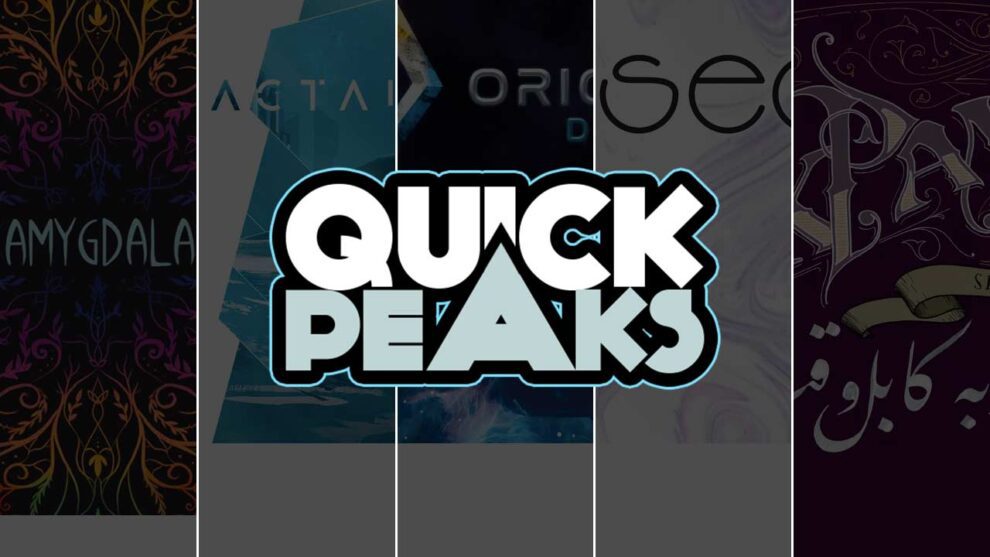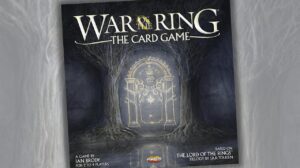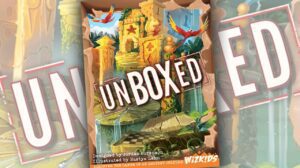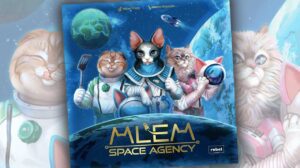Amygdala – Andrew Lynch
It’s been a less-than-stellar month for me and the Kiesling/Kramer design team, but what can you do? Sometimes that happens. Pueblo was an interesting idea that didn’t result in an interesting game, and now we have Amygdala, a resource management and tile-laying game that’s about emotion. Really, it’s an abstract game.
I thought Amygdala was perfectly alright. It didn’t do much for me, but one member of my playgroup enjoyed it tremendously, enough so that he requested it at subsequent game nights. It looks great on the table, especially if you play on the black-and-neon side of the board. I thought the ten-space limit for inventory was a fun restriction, but I’ve seen that before. The tile-laying isn’t dynamic enough for my tastes, and left me wanting a round of Babylonia. I personally wouldn’t recommend Amygdala, it struck me as forgettable, but it seems to have its audience.
Ease of entry?:
★★★★☆ – The odd bump or two
Would I play it again?:
★★☆☆☆ – Would play again but would rather play something else
Read more articles from Andrew Lynch.
Fractal: Beyond the Void – David Wood
Fractal touts itself as an “an ever-changing, story-driven” 4X legacy campaign game which can accommodate up to 4 players. Each player takes on the role of an asymmetric faction vying to gain the most victory points over 4 cycles by colonizing new sectors, winning battles, overcoming obstacles and events, and achieving other random objectives.
The components and artwork are fabulous, yet what really makes Fractal standout are the unique mechanics. We don’t have space here to discuss them all, so we’ll highlight just two. First, each turn a player must take 2 different actions from among the 6 different types available. Most require spending a credit. However, if you run out of credits, you can always play an action by “depleting” it. You won’t be able to play that action again this cycle, but you can spend influence at the end of the cycle to make it available the next cycle.
Another innovation is how combat is handled. There’s no determining battle odds and rolling dice. Instead, players simultaneously reveal a tactics card from their hand of available tactics depending on what units they have present. The cards are then resolved in initiative order and then discarded. This process is repeated until only one player remains.
There are a whole lot more in Fractal to explore – singularities, artifacts, “living galaxies”, and new technologies. Let the campaign begin.
Ease of entry?:
★★★★☆ – The odd bump or two
Would I play it again?:
★★★★☆ – Would like to play it again
Read more articles from David Wood.
Orion Duel – Justin Bell
Orion Duel (2023, Matagot) is a puzzle game for two players, a game I tried for the first time at SPIEL 2023. Using a personal 14-tile set of pieces, each player is racing to place their tiles in a way that connects their tile color majority from one end of the circular map to the other before their opponent. Two other end-game conditions are possible, including one where you try to run the other player into a series of black holes.
During my first play, I thought Orion Duel was OK, so I waited a few months to try it again with my family. Fast forward to the present; my nine-year-old daughter was willing to give this a spin. Our game was over in about eight minutes. “I’m not sure about this one, Daddy,” was my daughter’s initial reaction. This, from a person who herself was one turn away from winning! Still, I had to agree, as turn-taking and board analysis wasn’t as interesting to me on my second play. Orion Duel, which is available at retail as well as Board Game Arena, is certainly best for fans of abstracted games, but it does tend to favor those who have played the game before. That might turn some people off if they want to dive into the competitive landscape available on BGA.
Ease of entry?:
★★★☆☆ – There were a few questions
Would I play it again?:
★★★☆☆ – Wouldn’t suggest it, but would happily play it
Read more articles from Justin Bell.
Sequitur – David McMillan
I grew up in a Scrabble-loving household, so word games have always held a special place for me. That’s why, when Meeple Mountain was approached about reviewing Sequitur, I leapt at the opportunity. This week, I finally had a chance to play it.
Sequitur is a word game played with round spheres that are about the size of 100-sided dice, with letters on them. As a round of play begins, players will have a collection of 8 of these on their racks. Each player begins the game with a set of cards that will allow them to manipulate the balls that are in play as well as a randomly drawn bonus card, which rewards points for meeting specific conditions (3 consonants in a row, for example). On a player’s turn, they will perform two actions: draw a goal card and either discard it or place it out as a public goal, and optionally play a card from their hand to manipulate the balls on their rack. After three such turns, players will collect cards from the bonus card row, in order of who scored the most points with their word.
Unlike other word games, in Sequitur, scoring the most points with your word only gives you first dibs at the public goals. So, you can still do very well as long as you’re able to fulfill the conditions of the various public goals cards, as well as the one you begin the game with.
I enjoyed my first game of Sequitur. It was a lot more challenging than I expected it to be and I didn’t fare as well as I thought I would. But, it was enough that I look forward to revisiting it again soon. Watch out for my upcoming review!
Ease of entry?:
★★★★☆ – The odd bump or two
Would I play it again?:
★★★★★ – Will definitely play it again
Read more articles from David McMillan.
Pax Pamir (Second Edition) – K. David Ladage
Pax Pamir is not like any other game I have ever played. It has all the elements that would make you think this is an area-control wargame; sure, it has some elements of this, but this is most definitely not what it is. It has cards, a market and money… all of these things are there, but it really fails to become a hand-management or deck-building game, or an economic game. After a few plays, I can tell you I am at a loss as to how to define this game as anything other than amazing. Let me explain with a simple example: I played four games and, in those games, the vast majority of combat took place not on the map with military units; it took place on the card tableaus with spies.
There is a history when it comes to this game’s publication that I will not get into other than to say that, best I can tell, the time period and events the game is covering are handled in a respectful, non-judgemental manner. And in the end, you have a game that is as beautiful as it is thought-provoking.
Thought-provoking here comes in many layers: there is the text on the cards that explain who this person or group of people are, how they were involved, and so on. So as you read each card, you get a sense of the chaos and craziness of this time. But you are also feeling it through the game-play. It is quite difficult to keep track of all the things that can go wrong for you after your turn is over and before the next one begins. And this is as it should be.
Check out our review of Pax Pamir: Second Edition.
Ease of entry?:
★★★☆☆ – There were a few questions
Would I play it again?:
★★★★★ – Will definitely play it again













Add Comment